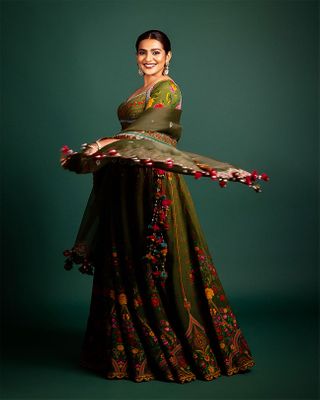
Goynar Baksho Movie Review
Rashmoni dies a peaceful death and is quite relaxed to leave her earthly existence, but is not to keen to leave her belongings especially her 'goynar baksho' (jewellery box) behind. Director Aparna Sen's latest Goynar Baksho explores the possibilities of a jewellery box that travels through time and through which several lives around it alters. After the successful screen adaptation of 'Japanese wife' Aparna Sen adapts Shirshendu Mukhopadhyay's story Goynar Baksho with equal ease. Goynar Baksho is a period-drama exploring the various nuances of life. From marriage to family rivalry to the bigger problems of the crisis of the nation everything gets a place in the narrative.
Somlata (Konkona Sen Sharma) marries Saswata Chatterjee and becomes the younger daughter-in-law of the Mitra household. Her family being poor she has to succumb to the duties of being a part of the zamindar household. Pardon, the Mitra's are no more zamindar's but they still keep alive the sentiments of being one and can go on to do anything from fighting a case for their ancestors house, to selling off their valuables to fuel their aristocracies.
One afternoon Somlata discovers her aunt-in-law (pishima) dead, she tries to run away scared of the consequences. The ghost of Rashmoni (Moushumi Chatterjee) stops her. She insists her to take her goynar baksho and keep the same in lock and key, so that no one finds it. Rashmoni lived the life of a widow who was married to an aged man, who died by the time she was 12 years old. The 50 grams of gold in her goynar baksho (Jewellery box) , has saved her through her life and has forced her brother's to take care of her, she knew they would not take much time to sell off her gold, once she closes her eyes. Somlata eventually becomes the caretaker of Rashmoni's gold and slowly becomes her confidante by winning her trust. When her in-laws face a turbulent blow financially, Somlata holds the rein of the family together by utilizing the jewellery to open a sari shop with her husband- 'Rashmoni Saree house'. Yet much to the ghost's prophecy she can only mortgage the jewels for the timing, to arrange for a capital. Over the time with a close guidance from Rashmoni, the business begins to flourish and the Mitra household starts to get back their lost splendor. The narrative then moves ahead to 1971 when Somlata's daughter Chaitali (Srabanti Biswas) has grown of age and is 19. She holds an uncanny similarity with Rashmoni and quite strangely can see her grand aunt, much like her mother.
The intricacies of the political scenario, the position of women in the society and the flaws of the zamindari are represented quite well through the narrative. There is a layered story in almost every detail of the film. Finally through Chaitali the goynar baksho ends up in the hands of the 'Muktijoddha' (freedom fighters) who are fundless and require a sufficient resource of arms and medicine to sustain their struggle.
The perfectionist in director Aparna Sen is bang-on with the mis-en-scene and the old Bengal charm is maintained with precision in the film.
Cinematography and acting are the other two rich areas of the film that truly deserves special mention. Dialogues, told much in rhythm and verse adds to the narrative and validates the period-drama existence of Goynar Baksho.
To summarize, Goynar Baksho is a must watch and is a story of many stories.









